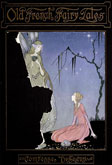Violette's Sacrifice
French folktale
When the dinner hour came, Violette arose, dressed herself and entered the dining-room where Agnella and Passerose were awaiting her. Ourson was not there.
"Ourson is not with you, mother," said Violette.
"I have not seen him," said Agnella.
"Nor I," said Passerose; "I will go and seek him."
She entered his chamber and found him seated upon his bed, his head resting upon his arm.
"Come, Ourson, come quick; we are waiting dinner for you."
"I cannot come," said Ourson, in a weak voice; "I have a strange heaviness in my head."
Passerose flew to inform Agnella and Violette of his illness and they were by his side in an instant. Ourson made an effort to rise in order to reassure them but he fell upon a chair. Agnella found that he had a violent fever and she prevailed upon him to lie down. Violette absolutely refused to leave him.
"I am the cause of his illness," she said, "and I will not leave his side till he is well. I shall die of anxiety if you force me to leave my dear brother."
Agnella and Passerose also installed themselves near their dear invalid but alas! soon poor Ourson did not recognise them. He was delirious! He called his mother and Violette every moment and continued to call them most importunately and to complain of their absence, even while they were holding him in their arms.
Agnella and Violette never left him day nor night during all his sickness. The eighth day, Agnella, exhausted with fatigue, had fallen asleep near the poor sufferer's bed; his difficult respiration and lifeless eye seemed to announce the near approach of death. Violette was on her knees, holding and pressing in her fine white hands the hairy hands of Ourson and covering them with tears and kisses.
In the midst of this scene of desolation, a clear sweet song interrupted the mournful silence of the chamber of the dying boy. Violette started. This soft melody seemed to bring consolation and happiness; she raised her head and saw a lark perched upon the open shutter.
"Violette!" said the lark.
Violette trembled fearfully.
"Violette," repeated the little soft voice of the lark, "do you love Ourson?"
"Do I love him? Ah! love him—I love him more than any one else—more than I love myself."
"Would you purchase his life at the price of your happiness?"
"Yes, gladly would I purchase life for him by the sacrifice of my happiness and of my own life."
"Listen, then, Violette. I am the fairy Drolette. I love Ourson, I love you and I love your family. The venom which my sister the fairy Furious has blown upon the head of Ourson is sufficient to cause his death. Nevertheless, if you are sincere, if you really feel for Ourson the sentiments of gratitude and tenderness which you express, his life is in your hands. You are permitted to redeem it! But remember that you will soon be called upon to give the most terrible proof of your attachment and that if he lives you will pay for his existence by a most horrible sacrifice."
"Oh, madam! quick, quick, tell me what I am to do to save my dear Ourson. Nothing will be terrible to me, all will be joy and happiness if you aid me to save my brother Ourson."
"Well, my child, very well," replied the fairy. "Kiss his left ear three times, saying at each kiss: 'To thee!—For thee!—With thee!' Reflect again, Violette, before undertaking this cure. If you are not prepared for the most difficult sacrifices, the greatest misfortunes will overwhelm you and my sister Furious will be the mistress of your life."
As her only reply, Violette crossed her hands upon her breast, cast upon the fairy, who was about to fly away, a look of tender gratitude, and, throwing herself upon Ourson, she kissed his left ear three times, saying, with an accent loving and penetrating:
"To thee!—For thee!—With thee!"
Scarcely had she said these words, when Ourson uttered a profound sigh, opened his eyes, perceived Violette and seizing her hands carried them to his lips, saying:
"Violette, dear Violette! it seems to me I am awaking from a long dream. Tell me all that has passed. Why am I here? Why are you so pale and thin? Your cheeks are hollow, you seem to have grown old and your beautiful eyes are red with weeping."
"Hush!" said Violette, "do not wake your mother, who is sleeping by your side. She has not slept for a long time and is much fatigued. You have been very ill, Ourson!"
"And you, dear Violette, have you been resting?"
Violette blushed and hesitated.
"How could I sleep, dear Ourson, when I was the cause of all your sufferings?"
Ourson was silent. He looked at her tenderly, kissed her hands and again asked her to tell him what had passed. She told him but she was too modest and too truly devoted to reveal to him the price that the fairy had affixed to his cure. Ourson, therefore, was far from knowing the truth.
Ourson now felt himself restored to health, rose up, proceeded to his mother softly and awakened her by a kiss. Agnella thought he was delirious and called Passerose who was astonished when Violette told them that Ourson had been restored by the good fairy Drolette.
After all this, Ourson and Violette loved each other more tenderly than ever and they never left each other unless their occupations forced them to be apart.
Old French fairy tales

Notes: The book contains 5 long French folktales. Each story has several chapters.
Author: Comtesse de Ségur
Published: 1920
Publisher: The Penn Publishing Company, Philadelphia